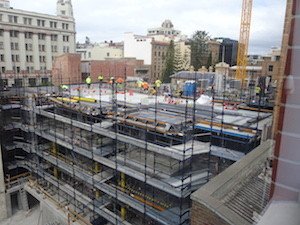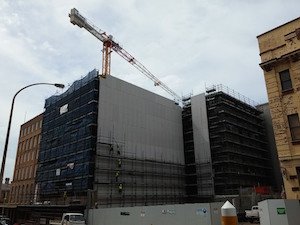 In this interview, construction Project Management Specialist Richard Kolomy shares with Samantha Alford how he has successfully lead a broad range of construction projects through the use of his three pillars of safety, quality and economy. He discusses how he became the expert he is in this vital industry.
In this interview, construction Project Management Specialist Richard Kolomy shares with Samantha Alford how he has successfully lead a broad range of construction projects through the use of his three pillars of safety, quality and economy. He discusses how he became the expert he is in this vital industry.
In today’s economy, construction is the lifeblood of economic development. It provides employment, accommodation, and educational institutions and is a strong indication of the strength or otherwise of the economy. The success of such projects however, whilst involving a multitude of parties, often depends on the skills and expertise of the Construction Project Manager.
Over time, and after experiencing a variety of projects from boutique homes, to civil construction and large scale developments, Richard honed his skills in managing the challenges of people leadership, resource management and client expectations.
He shares his knowledge and experience in this interview.
The Interview
Samantha: Welcome to Business Innovators Radio. You’re with Samantha Alford. Today’s guest expert is Richard Kolomy from Valentine Constructions. He helps construction companies successfully deliver commercial projects on time and on budget, and he’s going to share with us some of his tips today to how to do exactly that. Richard, welcome to the show.
Richard: Thank you, Samantha. It’s great to be here.
Samantha: Thanks for that. So Richard, your company is Valentine Constructions, and you’re a construction project manager. When I was doing some of the research around this area and this discipline, I was curious about what exactly a construction project manager is, and is that different to a construction manager? And how does that flex across the industries?
Richard: A construction manager is much more involved in the day-to-day management of a particular project, for instance. So a company will engage with a developer, or they might be doing the development in-house. And what their construction manager does is he focuses mainly on that single project, maybe two projects at the most. But they’re generally focused on one large project, if it’s large enough, and they basically organize the day-to-day activities and the programming for that project to ensure it runs smoothly, runs on time, and runs on budget.
 A project manager works at a little bit more of a distance to that. They’re much more involved in office-type work, feasibility studies, and contract administration, choosing certain types of sub-trades that will be working onsite based on their tender price. So they’ll put tenders out, they’ll get the contracts signed, and then engage certain individuals. They also get involved in the design aspects of buildings.
A project manager works at a little bit more of a distance to that. They’re much more involved in office-type work, feasibility studies, and contract administration, choosing certain types of sub-trades that will be working onsite based on their tender price. So they’ll put tenders out, they’ll get the contracts signed, and then engage certain individuals. They also get involved in the design aspects of buildings.
So the very early stages prior to construction, and also do final costings and budgets to ensure that the project comes in on time and on budget. And also liaising with banks, obviously, to ensure that the progress payments are adequate for the duration of the project. So that’s much more the project manager’s role. A construction project manger’s role generally dips in to both of those sides. They’re much more of a diverse person. They can work on the feasibility early works, as well as managing the actual construction process itself.
Samantha: And do different projects require different types of roles, or do they kind of all span all sorts of projects?
Richard: It definitely depends on the size of the project. So large inner-city projects, something that might be 50 floors or something like that is so large that that requires more than one individual. So then you have a certain type of…if you like to call it hierarchial you could, but you have foremans, obviously, gang leaders, foremans, site managers, construction managers, and then project managers. And there’s a whole line of individuals. The smaller the project, you don’t need as many different layers of people to manage the individuals. As you can imagine on a large project, it’s quite difficult to manage materials, handling, and things like that. One individual can’t keep an eye on a large project.
Samantha: It sounds pretty complex. I’m curious about Valentine Constructions, specifically, and what kind of clients that you help. Because it can be quite a broad industry, as I understand it.
Richard: Yes, the construction industry changes a lot. It’s very cyclical in nature. You never know what your next project is going to be. If you pigeonhole yourself into a certain type of client or process that you aren’t engaging when that area slows down, such as [inaudible 00:04:01] mining at the moment is a good example, then you don’t have anywhere else to go from there. So it’s very important to be very diverse, and to be able to dip into industrial projects, commercial projects, and even domestic projects, no matter how big or small you are.
When you start looking at smaller projects like the domestic sector, it’s a bit difficult to compete with project time builders, because they’ve got their own industry in itself. So that’s quite separated. But I’m working for individual clients to build their houses or some of them might be a higher architectural standard, that’s definitely the area that you diversify into.

